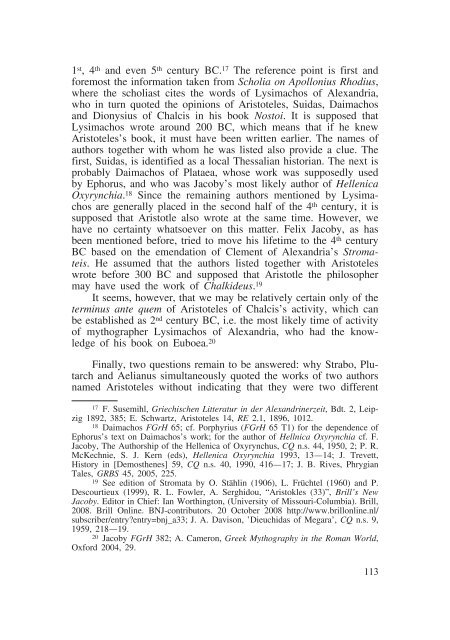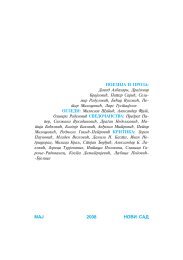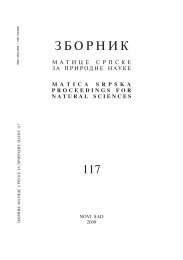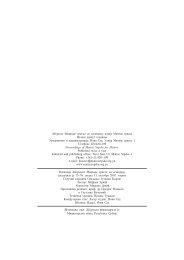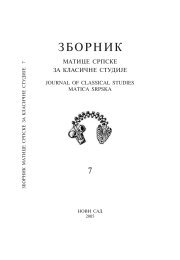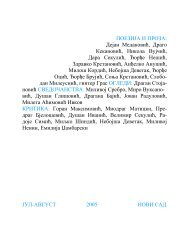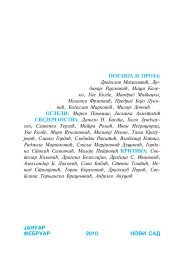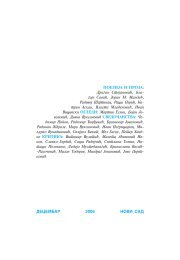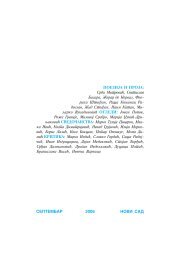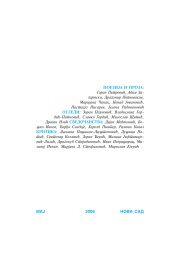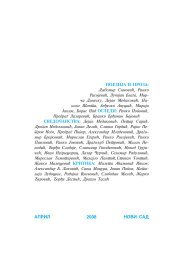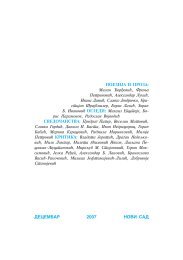Create successful ePaper yourself
Turn your PDF publications into a flip-book with our unique Google optimized e-Paper software.
1 st ,4 th and even 5 th century BC. 17 The reference point is first and<br />
foremost the information taken from Scholia on Apollonius Rhodius,<br />
where the scholiast cites the words of Lysimachos of Alexandria,<br />
who in turn quoted the opinions of Aristoteles, Suidas, Daimachos<br />
and Dionysius of Chalcis in his book Nostoi. It is supposed that<br />
Lysimachos wrote around 200 BC, which means that if he knew<br />
Aristoteles's book, it must have been written earlier. The names of<br />
authors together with whom he was listed also provide a clue. The<br />
first, Suidas, is identified as a local Thessalian historian. The next is<br />
probably Daimachos of Plataea, whose work was supposedly used<br />
by Ephorus, and who was Jacoby's most likely author of Hellenica<br />
Oxyrynchia. 18 Since the remaining authors mentioned by Lysimachos<br />
are generally placed in the second half of the 4 th century, it is<br />
supposed that Aristotle also wrote at the same time. However, we<br />
have no certainty whatsoever on this matter. Felix Jacoby, as has<br />
been mentioned before, tried to move his lifetime to the 4 th century<br />
BC based on the emendation of Clement of Alexandria's Stromateis.<br />
He assumed that the authors listed together with Aristoteles<br />
wrote before 300 BC and supposed that Aristotle the philosopher<br />
may have used the work of Chalkideus. 19<br />
It seems, however, that we may be relatively certain only of the<br />
terminus ante quem of Aristoteles of Chalcis's activity, which can<br />
be established as 2 nd century BC, i.e. the most likely time of activity<br />
of mythographer Lysimachos of Alexandria, who had the knowledge<br />
of his book on Euboea. 20<br />
Finally, two questions remain to be answered: why Strabo, Plutarch<br />
and Aelianus simultaneously quoted the works of two authors<br />
named Aristoteles without indicating that they were two different<br />
17 F. Susemihl, Griechischen Litteratur in der Alexandrinerzeit, Bdt. 2, Leipzig<br />
1892, 385; E. Schwartz, Aristoteles 14, RE 2.1, 1896, 1012.<br />
18 Daimachos FGrH 65; cf. Porphyrius (FGrH 65 T1) for the dependence of<br />
Ephorus's text on Daimachos's work; for the author of Hellnica Oxyrynchia cf. F.<br />
Jacoby, The Authorship of the Hellenica of Oxyrynchus, CQ n.s. 44, 1950, 2; P. R.<br />
McKechnie, S. J. Kern (eds), Hellenica Oxyrynchia 1993, 13—14; J. Trevett,<br />
History in [Demosthenes] 59, CQ n.s. 40, 1990, 416—17; J. B. Rives, Phrygian<br />
Tales, GRBS 45, 2005, 225.<br />
19 See edition of Stromata by O. Stählin (1906), L. Früchtel (1960) and P.<br />
Descourtieux (1999), R. L. Fowler, A. Serghidou, “Aristokles (33)", Brill's New<br />
Jacoby. Editor in Chief: Ian Worthington, (University of Missouri-Columbia). Brill,<br />
2008. Brill Online. BNJ-contributors. 20 October 2008 http://www.brillonline.nl/<br />
subscriber/entry?entry=bnj_a33; J. A. Davison, 'Dieuchidas of Megara', CQ n.s. 9,<br />
1959, 218—19.<br />
20 Jacoby FGrH 382; A. Cameron, Greek Mythography in the Roman World,<br />
Oxford 2004, 29.<br />
113


